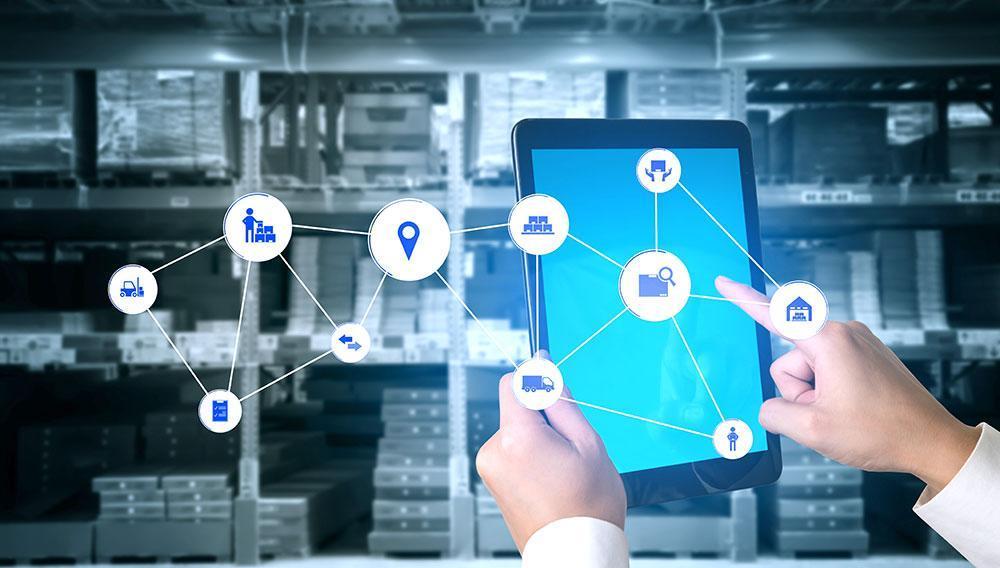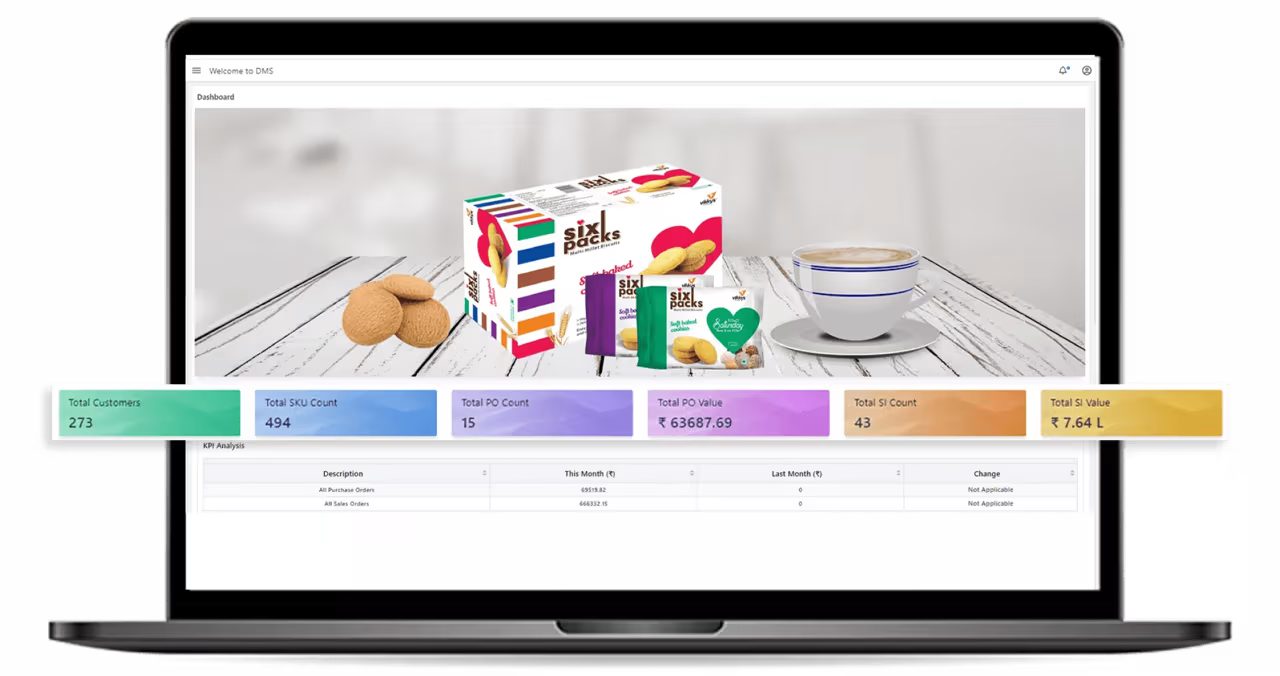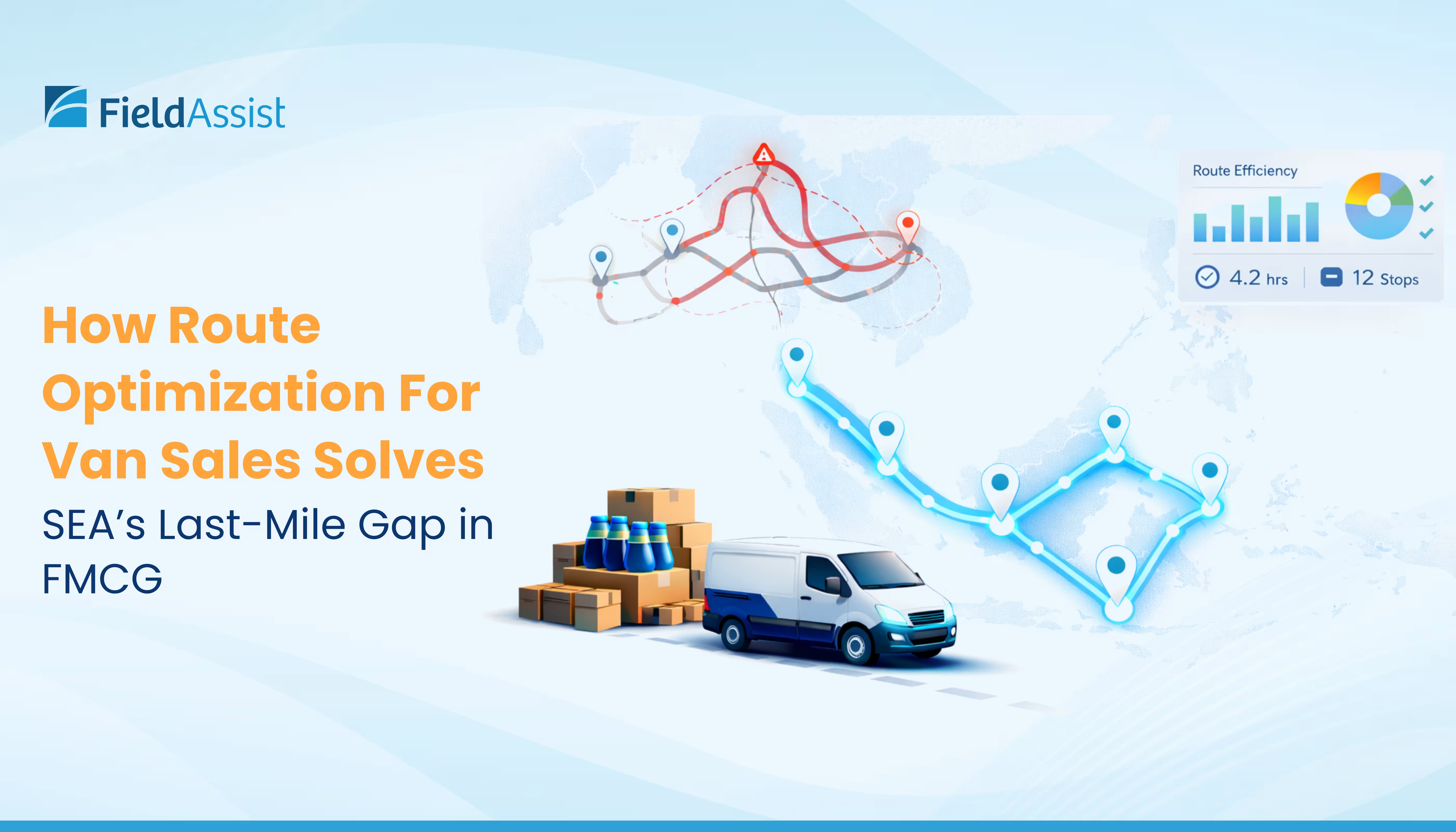7 reasons why you need an online Distributor Management System (DMS)
Discover the Benefits of an Online Distributor Management System (DMS): 7 Key Reasons to Streamline Your Distribution Operations.

This blog talks about the rapid growth of India’s FMCG sector, the critical role of distribution management, and why a modern Distributor Management System (DMS) is now indispensable. You’ll learn what a DMS is, its key components, and how solutions like FieldAssist DMS streamline operations, boost efficiency, and strengthen the FMCG distribution channel.
Continue reading to get more insights on how the best distribution software can transform your supply chain into a competitive advantage.
FMCG: Unlocking potential in India’s consumer market
Indians are young. The average Indian is barely 29 years old.
And they’re getting richer and richer day by day.
All this translates to huge spending power. Especially in the FMCG industry, which is the fourth largest sector of the Indian economy.
Few industries globally are as competitive as the FMCG market. Rising disposable incomes, government policies, changing lifestyles, and increased consumer awareness have completely transformed the landscape from what it was even half a decade ago.
FMCG is the fourth largest sector of the Indian economy. The COVID slump is a thing of the past. The industry is bouncing back with a vengeance – both in urban and rural markets. Moreover, the industry is not exactly cyclical; there’s demand for FMCG products all-year round.
And it’s not just how much India has covered so far, but how much it has yet to cover. The sector has been on an upward trend since India allowed 51% FDI in multi-brand retail and 100% in single brand back in 2012. Moreover, rising disposable incomes and low market penetration in rural areas hold great promise for expanded revenues. The market is expected to grow around 15% annually for the next few years.
According to a survey, 29% respondents stated that they spent between 500 and 1,000 rupees on an average during in-store shopping trips. Annual FMCG spending per household is expected to touch ₹20,000 by the end of 2025.
The Role of Distribution in FMCG Growth
In the FMCG sector, strong distribution is often the difference between growth and stagnation. With rising competition and consumer demand spread across both urban and rural markets, companies need efficient distribution management to reach the right outlets at the right time.
A modern Distributor Management System (DMS) helps brands build this advantage. By digitizing secondary sales, stock movement, and invoicing, a distribution management system software ensures transparency and efficiency across the entire FMCG distribution channel.
Platforms like FieldAssist DMS act as more than just software for distributors; they function as a complete distributor and management system, connecting manufacturers, distributors, and retailers on one platform. With features like real-time inventory visibility, claim management, and GST compliance, an online DMS helps brands reduce costs, increase speed, and drive smarter decision-making.
In short, the best distribution software is not only about automation but also about creating a scalable, data-driven backbone for growth. By using the right DMS system software, FMCG companies can expand coverage, improve distributor performance, and stay ahead in a highly competitive market.
What is a Distributor Management System (DMS)?
A Distributor Management System (DMS) is a specialized distribution management system software that helps FMCG and CPG companies manage, monitor, and streamline their entire FMCG distribution channel. Instead of relying on manual tracking, spreadsheets, or disconnected tools, businesses can use a DMS system to gain complete visibility into secondary sales, inventory, claims, and distributor performance.
Modern solutions like FieldAssist DMS simplify complex distribution processes by connecting manufacturers, distributors, and retailers through a unified online DMS platform. This not only enhances transparency but also ensures real-time data sharing across the distribution management network.
With the right software for distributors, brands can:
- Track orders, inventory, and claims seamlessly.
- Strengthen their distributor and management system with data-driven insights.
- Improve decision-making through analytics and reporting.
- Optimize operations across the FMCG distribution channel.
Choosing the best distribution software means empowering your sales and distribution teams with tools that reduce leakages, improve efficiency, and drive growth. In essence, a distributor management system is not just about order tracking—it’s the backbone of modern distribution software for consumer brands.
Key Components of a Distributor Management System (DMS)
A robust Distributor Management System (DMS) forms the backbone of modern distribution management. Whether it’s managing secondary sales, stock, or promotions, the right distribution management system software ensures brands have complete visibility and control across their FMCG distribution channel. Here are the essential components every business should look for:
1. Order and Billing Management
A core feature of any distributor and management system is the ability to automate order booking, invoicing, and settlements. Advanced dms system software allows bulk invoice generation, credit management, and error-free billing at scale.
2. Inventory and Stock Control
Real-time visibility into stock movement is critical. Modern distribution software provides instant insights into secondary sales, stock positions, and replenishment needs, helping avoid shortages or overstocking.
3. Claims and Schemes Management
Trade schemes are central to FMCG growth. A good online DMS simplifies claims processing, validates compliance, and provides detailed analytics on promotions, ensuring higher ROI and reduced disputes.
4. Distributor Performance Tracking
With software for distributors, companies can measure sales, coverage, and performance by distributor and region. Tools like FieldAssist DMS provide detailed dashboards to compare performance and align incentives.
5. Auto Stock Replenishment (ARS)
AI-powered forecasting helps predict demand and automatically trigger stock replenishment. This feature in the best distribution software eliminates stockouts and ensures timely deliveries across markets.
6. GST and Compliance Management
Compliance is simplified with integrated tax and billing features. A modern distribution management system software can generate GST-compliant invoices, e-way bills, and reports with a single click.
7. Analytics and Reporting
Data is the backbone of decision-making. A comprehensive Distributor Management System provides real-time dashboards, sales trends, and territory-level insights to optimize the FMCG distribution channel.
Technology as a competitive differentiator
Yet, with great potential comes great competition. Consumers are spoilt for choice. Large established brands, both domestic and foreign, are facing stiff competition from established local players. For instance, the rusk segment alone consists of 2,500 local competitors, while nearly 40% of the snacking market is controlled by over 3,000 smaller or regional players.
In such a market, the key to a successful go-to-market strategy lies in a healthy and strong distributor network. One that has both the required breadth to reach all corners of your target market, as well as the depth of penetration and resources to cover it extensively.
Technology and logistics are two areas where companies stand to differentiate themselves. For the Consumer Packaged Goods (CPG) industry, the line “Technology is a game-changer” is not just a cliché, but everyday reality.
How to increase efficiency and decrease costs
Conventional or offline solutions fall short of the level of automation demanded by today’s supply chains. This is what makes a Distributor Management System (DMS) absolutely indispensable for CPG companies. It represents not just a technology point solution, but a complete business transformation, with little change management required.
A cloud-based, always-on system can help you become more efficient in your business operations. Activities that used to take months would take mere hours. Activities that would require you to hire, on-board, and train multiple employees or contractors would be fully automated – literally at the click of a button.

How a Distributor Management System (DMS) Can Help
Here are 7 specific ways in which DMS makes your life exponentially easier:
A smart distribution platform is no longer a luxury—it’s a necessity for FMCG and CPG brands looking to scale efficiently. A modern cloud-based DMS solution brings visibility, control, and automation to every stage of the distribution cycle, helping companies cut costs and unlock growth.
Here’s how the right system transforms operations:
- Faster Claims Processing
- Automated workflows ensure claims are validated quickly and accurately. With ERP integration, settlement times drop dramatically compared to manual processes.
- Reduced Invoicing Time
- A digital invoicing system within DMS allows businesses to generate bulk invoices instantly, making billing faster and error-free.
- Real-Time Inventory Visibility
- Track stock movement and secondary sales in real time. A smart distribution solution lets you identify demand trends by geography and adjust resources accordingly.
- Distributor Performance Tracking
- Compare distributor output with sales goals. A partner management tool highlights underperforming areas and guides resource allocation.
- Auto Stock Replenishment (ARS)
- AI-driven insights forecast demand accurately and auto-initiate replenishment, preventing stock shortages and maintaining product availability.
6. Scheme & Promotion Management
Monitor scheme effectiveness and compliance with built-in dashboards. A trade promotion system helps brands fine-tune offers for better ROI.
7. Regulatory Compliance
Simplify tax compliance and reporting with e-invoice and e-way bill generation features built into your DMS.
Conclusion: DMS as the Backbone of FMCG Growth
India’s FMCG market is full of opportunities, but also intense competition. To succeed, brands need more than just strong products—they need robust distribution management backed by technology. A modern Distributor Management System (DMS) provides exactly that.
From automating invoicing and claims to enabling real-time stock visibility, scheme tracking, and predictive replenishment, the right distribution management system software ensures complete control across the FMCG distribution channel. Tools like FieldAssist DMS go beyond being just software for distributors; they act as a complete distributor and management system, connecting manufacturers, distributors, and retailers into one efficient, data-driven network.
Simply put, adopting the best distribution software is no longer optional—it’s a strategic necessity to cut costs, improve efficiency, and unlock scalable growth.
Smarter distribution starts here,
Book a demo today!







